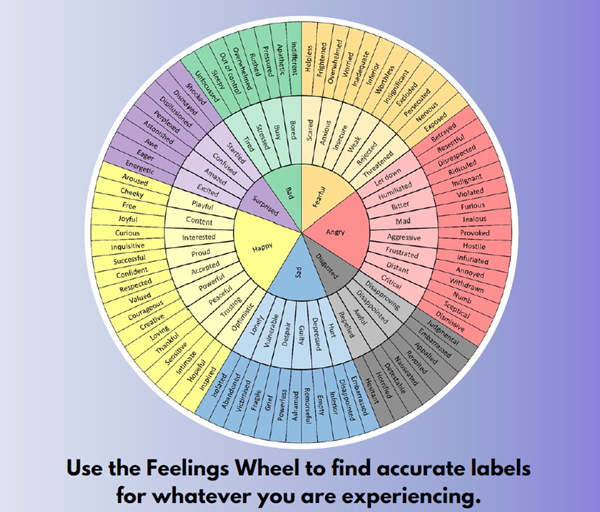How are you feeling ?
That simple yet vital question, often repeated in therapy, serves as a profound gateway to understanding and self-awareness. By guiding my clients to refocus inward and identify their emotions, whether through conversation or tools like the Feeling Wheel, we uncover layers of experience that reveal the depth of their sadness, anger, or joy. This process not only helps them name their emotions but also empowers them to understand and process them in a meaningful, healing way.
View and Download a Copy of the Emotional Faces
View and Download a Copy of the Feeling Wheel

Why does my therapist keep asking me about my feelings ?
When I ask my clients about their feelings, it’s not uncommon for them to respond with a thought instead, reflecting how disconnected many of us are from our emotions. This disconnect isn’t unusual; many people haven’t been asked to explore what they truly feel, leading to uncertainty and even discomfort when they try to articulate it.
Therapists ask this simple yet pivotal question because it opens the door to emotional exploration, something many of us might unconsciously suppress. With time, my practice can help you:
Understand Your Feelings
Many clients realize they've never been asked how they feel before. Recognizing and naming emotions is an essential step in connecting with your inner self.
Difference Between Thoughts and Feelings
It’s common to confuse thoughts with emotions. I would encourage you to pause and reflect, helping you understand what you feel rather than what you think.
Explore the Underlying Layers of Feelings
Tools like the Feeling Wheel can help you peel back the layers of a single feeling. For instance, sadness might be tied to disappointment or neglect. Learning to pinpoint these layers can deepen your emotional awareness and aid healing.
Other Blogs
Services Offered
I know feelings are complex and can have different meanings
Understanding and expressing emotions can be deeply complex and, at times, overwhelming. Often, it’s not as simple as being just “mad” or “sad.” Building self-awareness and confronting emotions with vulnerability can feel intimidating, but it’s a vital step toward personal growth and connection. Primary emotions, like sadness or fear, require openness and invite others to meet our needs, fostering intimacy and understanding. On the other hand, secondary emotions, such as anger or resentment, are often protective and can create distance, acting as a shield against vulnerability. By exploring what’s beneath the surface of our emotions with tools like the feeling wheel, we can uncover deeper truths and create space for healing. This shift in perspective not only helps individuals grow but also allows relationships to strengthen through empathetic communication and understanding.

Am I depressed or just sad?
Feeling misunderstood or unable to explain your emotions to a therapist, it’s not because something is inherently wrong with you but rather the language being used to express those emotions. Many people unknowingly describe what they’re feeling inaccurately, leaving them feeling isolated.
For instance, I’ve worked with clients who initially described themselves as feeling “depressed,” only for us to uncover through deeper conversations that they were also grappling with intense anxiety for a long time. This overlap between anxiety and depression is more common than people realize, and understanding it can be a crucial step toward healing. Recognizing and articulating what you’re truly feeling is the first step to being understood, and it opens the door to effective support and solutions.
Understanding your feelings
Understanding and expressing emotions is a vital part of meaningful communication and building strong relationships. When we identify how we’re feeling, we can articulate our needs more clearly, paving the way for deeper connection and mutual understanding. For instance, saying, “I feel sad, I need comfort,” or “I feel confused, I need clarity,” creates a space where needs can be addressed constructively. For the listener, practicing empathetic listening is key; it’s about fully tuning in to what’s being expressed, without rushing to fix or solve the issue. This approach fosters mutual respect and strengthens emotional bonds, allowing both individuals to feel seen, heard, and supported.
Placer Therapy
Whether you review anger as a secondary emotion or a primary emotion, the important thing is to recognize what you’re feeling, discover why you’re feeling it, and learn how to manage the experience of negative emotions. If you’re struggling with emotional issues or recognizing that your relationships are struggling due to emotional issues and would like to seek the help of a trained therapist, call me today.
Contact me today by calling (530) 830-9079 , email [email protected], or booking a session by hitting the request an appointment button below.
I offer both online therapy (learn more about online therapy here) and in-person therapy at my Rocklin California office; which is located at 6556 Lonetree Blvd, Suite #203
Ready for a
Better Relationship ?
I’m committed to guiding adults and couples toward enhanced mental health and enriched relationships.
Through the link below you can book a time for both in person and Tele-Health
Helpful information
Information for having therapy and the options to pay for it
Online therapy has become increasingly popular due to its convenience for those with busy schedules
EMDR therapy is a quicker, yet very effective therapy, that helps patients overcome traumatic memories.

Going to counseling can strengthen, or even save, your relationship. I urge people not to wait


